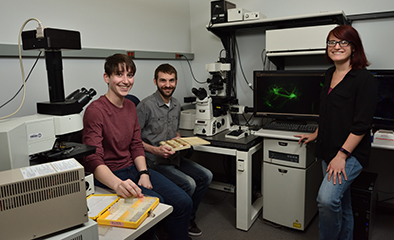CBMP Faculty
Ossama Kashlan, Ph.D.

Department: Medicine, Renal-Electrolyte
Email: obk2@pitt.edu
PubMed: Link
Dept / Lab Webpage: http://www.dept-med.pitt.edu/renal/faculty_info.aspx?fp=5496
CBMP groups: Cell Communication, Signaling and Ion Channel Biology
Research Interests
Epithelial Na+ channel (ENaC) function:
My lab seeks to understand the molecular mechanisms of ENaC regulation by extracellular factors. ENaC mediates sodium transport in a number of epithelia, including the distal nephron, airway, bile ducts, and colon. ENaC is directly regulated by a number of factors found in the extracellular spaces of ENaC expressing tissues. These include: inhibiting sodium and chloride ions, which vary in concentration; activating proteases, which are regulated or elevated in disease; and biliary factors, which are high in concentration in the enterohepatic circulation and can be elevated in the general circulation in liver disease. Using electrophysiology and molecular biology approaches, our research has identified key protein domains and interfaces that interact with these factors and transduce effector binding to change the conformation of the sodium conducting pore.
ENaC evolution:
Effectors that directly regulate ENaC activity influence channel activity through defined sites. We are investigating the evolutionary development of these modes of regulation to gain insight into their molecular mechanisms and physiologic roles. We are using computational biology tools along with molecular biology and electrophysiology to study ENaCs from key organisms. Our research suggests that proteolytic activation of the channel developed concurrently with the vertebrate terrestrial migration, suggesting that either lung function or renal sodium retention drove its evolution. Our research also suggests that modules important for aldosterone regulation predate aldosterone signaling.
ENaC physiology:
We are investigating the effect of ENaC activators on fluid and electrolyte handling in whole animals. Extracellular factors that directly regulate ENaC may vary in concentration in healthy animals or become greatly elevated in disease states. We are determining whether direct ENaC regulation by physiological activators causes fluid retention and potassium wasting in the whole animal. To determine this, we are performing metabolic balance studies and measuring whole body water and mineral content. Our research suggests that activating ENaC in the kidney has a significant impact on fluid and electrolyte handling.
